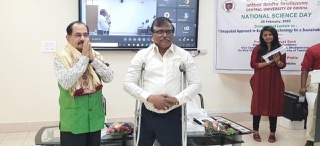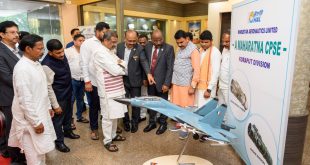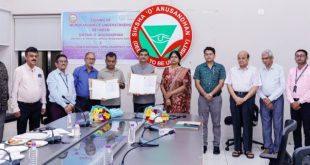The Central University of Odisha celebrated National Science Day by organizing a distinguished lecture on ‘Integrated Approach in Science & Technology for sustainable future’ at its campus today on Monday.
Eminent Scientist & Academic with international repute Vice-Chancellor of Asian Institute of Public Health University, Bhubaneswar the former Vice-Chancellor, Central University of Tamil Nadu, and former Adviser of United Nations (World Health Organization) Padmashree Prof. Aditya Prasad Dash delivered the distinguished lecture on this occasion. The Vice-Chancellor I/c of Central University of Odisha Prof. Sharat Kumar Palita inaugurated and chaired the program.
He highlighted the various scientific achievements of India including the green revolution, white revaluation, and blue revolution, space science, pharma science, communication, and information science, which contributed a lot towards the development of the nation as well as made India as one of the best countries in the world. He said “science played an important role in every sphere of life. Only for science, we are very close to every corner of the world.
To commemorate the birth anniversary of Nobel Laureates first Indian Scientist, C.V. Raman, we observe the National Science Day, respect the scientist and promote scientific temperament among the people”. He advised the students and research scholars to create a scientific base by which it can be transformed into our livelihood and sustainable future. Prof. K. Kameswar Rao, Visiting Professor of the Dept. of Biodiversity and Conservation of Natural Resources spoke about the National Science Day program.
Prof. Dash spoke on ‘Contol/Eliminate Neglected Tropical Diseases to achieve Sustainable Development Goals’. He highlighted the importance of the science with regard to 17 sustainable development goals including good health implemented in the 195 countries with a target to achieve till 2030. He emphasized the science and research for good health by citing the example in eradication, elimination, and control over the various Neglected Tropical diseases (public health) like malaria, dengue, fasciolasis, leprosy, rabies, dracunculiasis, leishmaniasis, lymphatic filariasis, schystomiasis, trachoma, and Yaws. He said ‘ it is an integrated approach of science and technology in eradication, elimination and control over the various diseases towards achieving sustainable goals, particularly in public health”.
He highlighted the progress of the neglected Tropical Diseases (NTD)Road Map started on 28 Jan, 2021 targeted to achieve 2030. He said “annually over 1 billion people benefitted from at least one NTD intervention around the world. By following the integrated scientific approach we are able to control the NTD in India including leprosy and different vector-borne diseases like malaria, dengue, chikungunya, lymphatic filariasis”. While eradicating Lymphatic Filariasis (LF) he said “India is working towards accelerated elimination of the Lymphatic Filariasis (LF) by 2030 through its twin pillar approach viz. interruption of transmission by achieving less than 1% mF rate and stopping of MDA treatment (in hot spots) and access to a minimum package of MMDP care by all patients: 100% Lymphoedema Management and 100% hydrocelectomy by 2030”. He expressed his concern towards climate changes and its effect on public health. He said” any change in
climate overtime whether due to natural variability, a result of human activities; climate change poses a major and largely unfamiliar challenge. It is a newer challenge to ongoing efforts to protect human health”. He advised promoting scientific knowledge among the youth generation to make India develop and happy out of it.
 Update Odisha-Latest Odisha News I Breaking News Get latest news on Odisha, Govt. Jobs, OSSC, OPSC, Entertainment, Crime, Sports, and Education
Update Odisha-Latest Odisha News I Breaking News Get latest news on Odisha, Govt. Jobs, OSSC, OPSC, Entertainment, Crime, Sports, and Education



